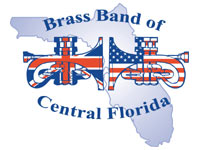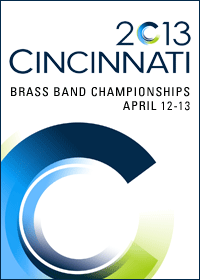Brass Band of Central Florida and Regent Hall Band
17-Nov-2006Conductors: Michael J Garasi, Stephen Hanover
Regent Hall
London
Tuesday 14th November
 It was Regent Hall's privilege to host the Brass Band of Central Florida at the start of a brief tour prior to their participation in Brass in Concert at The Sage, Gateshead.
It was Regent Hall's privilege to host the Brass Band of Central Florida at the start of a brief tour prior to their participation in Brass in Concert at The Sage, Gateshead.
With precious little time to recover from their flight, and only limited opportunity for rehearsal at the venue, they nevertheless demonstrated their ability to build up a rapport with an audience, albeit a disappointingly small one, with less than a hundred people present apart form the two bands. The limited rehearsal time, coupled with the layout of the hall, also meant that they had to abandon much of the choreography that will no doubt play a part in their routines for Gateshead.
Regent Hall Band, under their bandmaster Stephen Hanover, provided excellent support, as they did last year when hosting the National Band of New Zealand, their programme actually containing several of the pieces used on that occasion, but, as Eric Morecambe would say, "not necessarily in the right (same) order". Martin Cordner's "Fanfare and Flourishes" made for a bright opening number, with cornets and trombones ranged around the band, who were seated in the body of the hall to leave the platform free for their American guests. The fanfare team returned to their seats as the music increased in tempo prior to the introduction of the featured melody, "The Power of Your Love".
The visiting players had been ranged around the hall as Regent Hall had played, and they gradually took their places during the opening number, an arrangement of Ravel's "Bolero" that opened with the side drum at the front of the platform and the basses seated at the rear. The familiar melody was first heard in the mellow tones of John Copella's flugel horn, as he stood in the balcony at the rear of the platform. Next to join in was the middle of the band, followed by the cornets who lined the steps at the side of the platform, before Dee McAfee, whose confident soprano playing is a prominent feature of the band's performance, knelt centre stage for his appearance.
As the band's charismatic conductor, Michael Garasi - himself a former percussionist and the arranger of the piece - stepped forward to the second side drum to bring the music to its climax, there was an unintended contribution as a floral arrangement fell off the edge of the platform - at least it was on the beat!
As with many bands from across the Atlantic, the Brass Band of Central Florida is very much at home in the world of big bands and jazz, as they demonstrated in their rendition of "Birdland", introduced by their conductor. The arrangement featured all sections of the band, with a particularly pleasant contribution from the horns and vibraphone, and stand-up solos from Dee McAfee on sop and Herb Bruce on trombone.
The "Shaker Melody" used by Aaron Copland in his ballet score "Appalachian Spring" is also familiar from its adaptation by Sidney Carter for the hymn "Lord of the Dance". Following the success of the ballet, Copland created a stand-alone arrangement under the title "Simple Gifts", and this has been transcribed for band by Michael Garasi. Opening with two solo cornets, one playing from the balcony at the rear of the audience, the band's fine percussion section then took over with a wash of sound on various mallet instruments - glockenspiel, marimba, xylophone and vibraphone - underneath a euphonium melody. The cornets and trombones then combined in a bright statement of the theme before being joined by the rest of the band.
The vocal chorus seemed even more refined than in Birmingham last year, and the closing bars were quite magical as the off-stage soprano and solo cornet were superimposed, with the percussion providing the final flourish.
One thing that American bands do know plenty about is how to tackle a rip-roaring circus march, with a number of composers being specialists in this genre. One of these, whose works have not often been transcribed for the brass band, is Henry Fillmore, who studied trombone before taking up employment with the Lemon Brothers Circus. "Rolling Thunder", in an arrangement by the band's solo euphonium Gail Robertson, certainly gave the trombone section the chance to display some lightning slide-work, and the other low brass did not get away lightly either.
Bill Holman's version of "Malaguena" for the Stan Kenton band has been the basis of many brass band versions, but it was his "Malaga" that gave the Brass Band of Central Florida another opportunity to let their hair down. With Gail Robertson and baritone player Steve Hewitt taking up trombones to make a five-strong trombone section, they settled comfortably into the appropriate style, whilst the contributions of the kit drummer were first class, several breaks being well-constructed, and making it hard to believe he only had one pair of hands. There was also some excellent work on vibraphone.
After the exuberance of "Malaga" it was the turn for Regent Hall's second contribution, and they opened with an off-stage trombone quintet playing the opening of Goff Richards' "I will follow him". Four of the section then entered at a canter to add a choreographed routine to some tidy playing, Dudley Bright being excused the dancing, which was not quite as slickly done as they have done in the past. Also, the band was a little heavy at times, swamping the solo lines in places.
There was also some uncertainty at the start of Ken Bonser-Ward's performance of Karl Jenkins' "Benedictus", with the intonation taking a few bars to settle down. The performance grew in confidence, however, and the blaze of sound when the full cornet section entered was quite impressive.
Their final item was Lorne Barry's "Credo". Accompanied by a powerpoint presentation illustrating the various moods of the music, and in particular the challenges facing the Christian, the playing soon consolidated after a couple of moments of nervousness. As the chorus "Tis so Sweet to Trust in Jesus" became more assertive, so the music grew in a well-judged crescendo, the band producing a full, balanced sound.
Michael Garasi's arrangement of Copland's "Fanfare for the Common Man" featured the front row cornets in unison, blending well together, although the bass drum (hired, together with the rest of the percussion equipment) was rather small for its purpose, and a little over-resonant. The tenor horns, led by Kevin Cramer with what appeared to be a custom-built instrument that he played left-handed, produced a good imitation of a French horn sound was they joined in, followed by the remainder of the band.
The evening included a World Premiere Performance, in the form of James Cheyne's "Scherzo for Trombone and Band", in the composer's words, "written as a portrait of Herb Bruce, and illustrating various aspects of his playing, his technique and his soloistic excursions." It is quite an aggressive, antagonistic work at times, setting the soloist against the band, but with quieter moments in the rather Dorsey-esque interludes.
It was a convincing reading, although there were a few problems in balance between band and soloist.
Bob Hinckley (Principal Cornet), John Copella (Flugel horn), Gail Robertson (euphonium) and Kerry Couch (trombone) were featured in "The Prayer", based upon a song featured by the world famous tenor soloist Andre Bocelli. Arranged as a double duet, the four soloists gelled nicely together, first cornet and euphonium then flugel and trombone, with more excellent support from the tuned percussion and solo horn.
The last big-band number featured was Gordon Goodwin's "Sing, Sang, Sung", with more vibrant playing from the band and soloists, before Herb Bruce took centre stage once more with a setting of "Beauty and the beast". Opening with the soloist unaccompanied, with good support from the remaining members of the trombone section, there was a little uncertainty when the band entered, but normal service was quickly resumed.
"Funiculi-Funicula", wrongly mistaken as folk tune by Richard Strauss who featured it I his early tone poem "Aus Italia", was in fact written to mark the opening of the new funicular railway on Mount Vesuvius in 1880. The variations performed by the band as their final programme item were based on a version for wind band by the Japanese composer/arranger Yo Goto. All sections of the band were featured, with prominent writing once more for the percussion, and it was certainly popular with the audience.
An encore was always likely to be on the cards, and it was no real surprise when he band struck up with Sousa's "The Stars and Stripes Forever". The traditional razzmatazz was all there in abundance, although on this occasion tiredness did seem to be overtaking Dee McAfee, as the soprano solo seemed a bit lacklustre. This was more than compensated for by the five trombones, standing across the front of the platform to add the trombone obbligato to the final section.
The final music of the evening came from Regent Hall band, who closed proceedings with a majestic reading of Norman Audoire's march "Montreal Citadel". Taken at a steady pace which allowed all the detail to be heard, it drew particular plaudits from the visitors on account of the full, round sound produced by the lower half of the band.
Thus drew to a close an evening of fine music-making, with the visitors showing once more that they are a force to be reckoned with. Despite the effects of jet-lag and the drawbacks of playing in unfamiliar surroundings, they showed a growing maturity, both in terms of sound and musical interpretation. The cornet sound, although undoubtedly on the bright side, is nevertheless a cornet sound, not a trumpet sound, whilst the horn section impressed throughout the evening. The front action tubas, fascinating to watch as they constantly move slides to adjust the tuning, provide a firm foundation, if lacking a little of the definition produced by the more familiar Bessons and Yamahas.
Above all, they clearly enjoy their music-making, and are likely to win more friends as their tour progresses, not to mention any scalps they may take at "Brass in Concert".
Peter Bale




